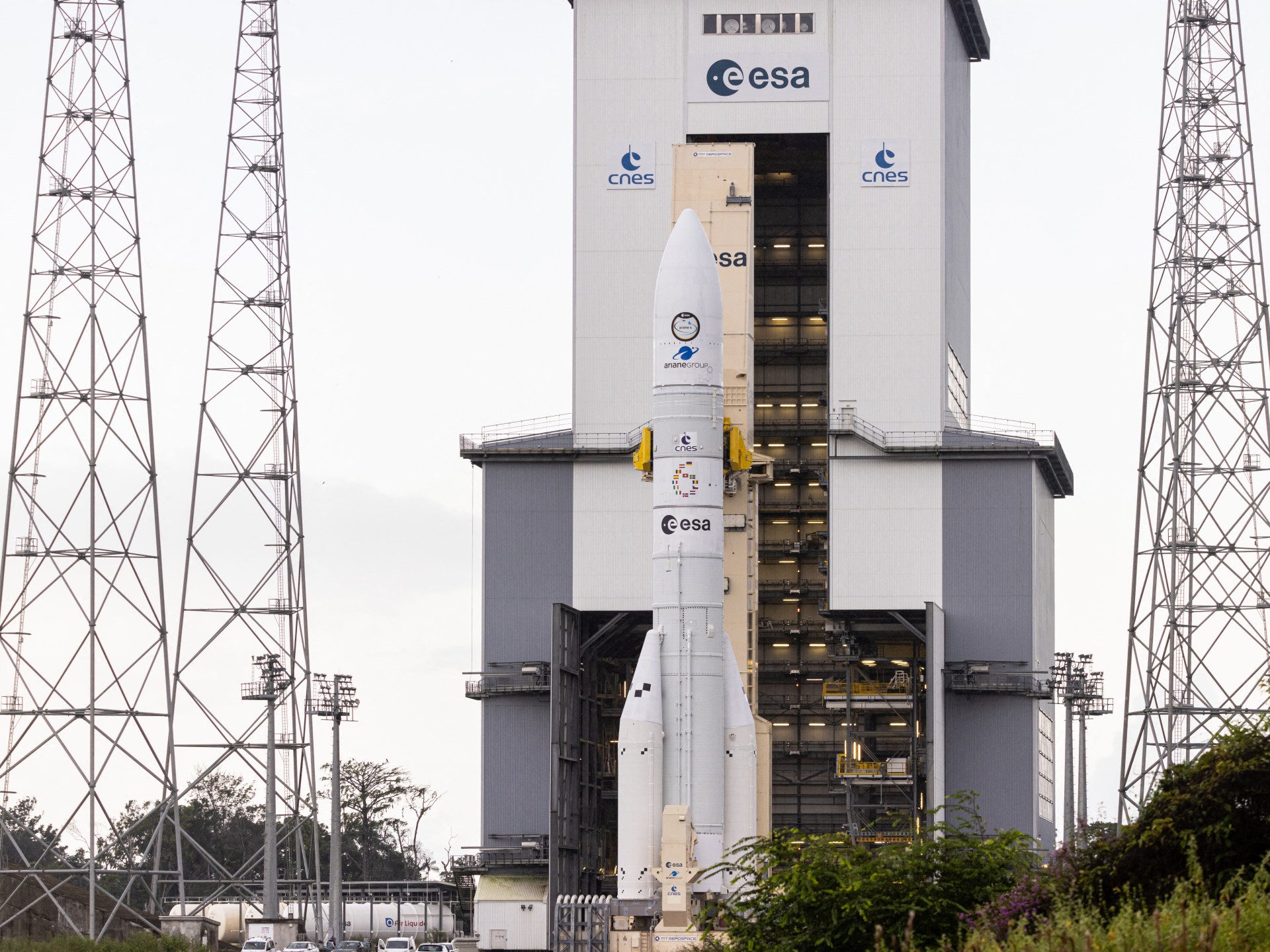
Maiden flight of European Space Agency’s (ESA) most powerful rocket set to lift off from Kourou, French Guiana.
Europe’s new Ariane 6 rocket is set to blast off for the first time, carrying with it the continent’s hopes of regaining independent access to space.
The inaugural flight of the European Space Agency’s (ESA) most powerful rocket is scheduled to lift off from Europe’s spaceport in Kourou, French Guiana.
The planned time for liftoff was delayed by one hour to 4pm local time (19:00 GMT) after routine checks revealed a “small” data issue which has been resolved, the ESA said on X on Tuesday.
Ariane 6’s maiden flight will also carry 17 different “passengers”, including 11 university micro-satellites, as well as re-entry capsules and small scientific experiments.
The launch plan
Since dawn in Kourou, the vast metal structure housing the rocket has been moved away, unsheathing the 56-metre (183 feet) behemoth.
Concealed in a nearby bunker, more than 200 experts in the launch centre will scrutinise the rocket until liftoff, ready to interrupt the countdown to solve any problems, ESA’s launch base project manager Michel Rizzi told journalists. He added that they will be in constant contact with the Jupiter control room, the hub of communication between the teams – and data sent from the rocket.
#Ariane6 launch update:
As part of standard operations in the Ariane 6 preparation after mobile gantry removal, routine checks in the ground segment equipment showed a small issue in the data acquisition. It has now been resolved.
Liftoff is now scheduled no earlier than 20:00… pic.twitter.com/kxI7Wo8PHj
— European Space Agency (@esa) July 9, 2024
A large number of armed forces will also watch over the launch, including three fighter jets.
All going well, the rocket’s two boosters and main stage engine will ignite at 4pm local time.
Franck Sainge, the launch system architect, added that there have been so many rehearsals that it all feels “routine – except this time it’s the real thing.”
The mission will be considered a success after it deploys its payload and the rocket’s reusable upper stage splashes down into the Pacific Ocean.
What does the launch mean for Europe
The delayed debut of Ariane 6 comes a year after its predecessor, Ariane 5, was retired, leaving Europe with no independent path to orbit for its satellites after setbacks involving a smaller Italian alternative and the severing of ties with Russia over Ukraine.
Europe has also been unable to launch satellites or other missions into space without relying on rivals such as Elon Musk’s US firm SpaceX.
Moreover, historically, nearly half of the first launches of new rockets have also ended in failure. That includes Ariane 5, which exploded moments after liftoff in 1996 – but out of its 117 launches over nearly 20 years, only one other flight would fail.
Gareth Dorrian, a space science researcher at the UK’s University of Birmingham, told the AFP that “the first launch of any new rocket is always fraught”.
But Ariane 5 started with explosive failure and “went on to become one of the most successful launchers in history”, he added.
Everyone at the Kourou launch site, which is surrounded by jungle on the South American coast, are hoping history does not repeat for Ariane 6.
“There is an element of risk because it is a first flight, but we have tried to reduce this as much as possible, so we are confident,” Philippe Baptiste, head of France’s CNES space agency, told AFP.
Tony dos Santos, the ESA’s Kourou technical manager, added that teams on the ground would only be able to “breathe our first sigh of relief when the first satellites have been released” an hour and six minutes after liftoff.
Ariane 6 is also scheduled for one more launch this year, six in 2025 then eight in 2026.
EMEA Tribune is not involved in this news article, it is taken from our partners and or from the News Agencies. Copyright and Credit go to the News Agencies, email news@emeatribune.com Follow our WhatsApp verified Channel





